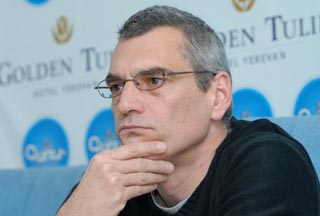Hence the obstacle of rapprochement of Armenian-Iranian relations is not Washington but Moscow

Indeed, the Crimea crisis continues to be in the center of attention of the world, including Armenian media but in the meantime other regional developments are taking place, which are no less important for our region and especially Armenia. We are talking about the positive change in the relations between Iran and Armenia. Last week the head of the internal affairs of the EU Katherine Ashton visited Iran. Since 2008 this was the first visits of a European politician of this caliber to Iran. In Iran Baroness Ashton on March 9 met with Iran’s foreign affairs minister Javad Zarif and yesterday she was received by Iran’s president Hasan Rouhani. During the conversation with her Iranian counterpart Ashton discussed matters regarding Iran nuclear weapon development. European countries have started sending political, economic, and parliamentary delegations to Iran, but “your visit (to Iran) as the representative of the foreign policy of 28 European countries has a greater political connotation,” Rouhani told Ashton. In addition to the nuclear negotiations, Iran and the EU should hold talks on many other areas of cooperation, Rouhani stated. In follow-up to the interim nuclear deal signed by Iran and the 5+1 group in Geneva last November, the two sides have started negotiations to hammer out a final nuclear deal in which all sanctions against Iran are lifted. Rouhani said Iran and the EU, “by passing the current stage properly,” will enter a new situation in which they can discuss very important strategic issues, such as establishing a “strategic relationship” in the areas of energy trade and the transit of goods. He went on to say that there are many issues in the world, and especially in the sensitive region of the Middle East, on which Iran and the EU can negotiate and cooperate, and “we hope that we can take new and serious steps” by using “the good atmosphere” that has been created in relations between Iran and the EU. Let’s add that the improvement of relations with Iran changed in a different direction after the election of the new president of Iran. In this regard, we decided to speak with the president of Regional Research Center Richard Giragossian.
-Mr. Giragossian, how what you interpret the general relations between the west and Iran?
-Judging from the visit of Katherine Ashton to Iran we may point out a few important developments. The first one shows that the improvement of relations between the west and Iran started in Geneva. The success started when the EU goes to Iran to meet Iranians instead of meeting them in Switzerland. Ashton stated during her visit that there is progress in relations but it would be much more difficult to come to a final agreement with Iran. The reason of that is the assumption that the west is trying to reduce its high expectations. Ashton didn’t wish to confuse the president of Iran because by saying that it is going to be difficult to come to a final agreement, has even more strengthened the position of the president in the country. In this regard, there are two important circumstances for Armenia. By improvement of relations between Iran and EU Armenia may increase its potential of relations with Iran. Secondly, Iran’s president’s visit to Armenia may also even more deepen Iran-Armenia relations. But in this case the problem is not Washington but Moscow. Now Armenia has started getting pressure from Moscow. Russians don’t like the fact that Russia has frozen its relations with Iran, which means that the latter might strengthen its relations with Russia.
-So what influence can the improvement of relations between Iran and west have on Russia’s role in the region?
-There won’t be a direct influence but in a broader sense it may increase tension because it may accelerate the reaction of Russia’s and Turkey’s influence in the region against West-Iran relations.
-Does the possible pressure from Moscow in any way depend on Iran-Armenia energy cooperation?
-Of course, we may say that the Russian pressure on Armenia is linked with the historic process of Armenian-Iranian relations. Therefore Russia will continue its pressure on Armenia.
-In that case, to what extent is the deepening of Iran-Armenia energy cooperation possible?
-The answer of this question is to what extent Armenia will withstand the pressure of Russia. To be honest after the September 3 decision I am not sure that the Armenian government has the political will to go towards Moscow.
-Can Armenia theoretically conduct a mediator’s mission between Iran and the West?
-We have once had that opportunity but it is smaller now. One of the greatest reasons is that after the contract with GazProm when Russia fully monopolized the gas sector of Armenia but in the long run Armenia has the opportunity to become a bridge between West and Iran.
-In the National Assembly a new ad hoc is created, which is to examine the contract with GazProm. They should be discussing the matter that Armenia will not have the right to import gas from another country till 2043. Do you think this can be considered another reason to resume gas talks with Iran?
-If there was democracy in Armenia then the direct linkage would be obvious. Unfortunately in the current political situation of Armenia the ad hoc discussions will hardly affect the talks with Iran. The problem is that there is a lack of trust to the Armenian parliament and government.
-There is an opinion that traditionally Iran has been conducting a balanced politics in the Caucasus and Iran has once mentioned that for them the construction of railroad with Armenia is not that important.
-The interesting thing is that Armenia has more significance for Iran than the other way around. The role of Armenia shouldn’t be underestimated. It means objectively all the neighboring countries of Armenia – Turkey, Georgia, Iran and Azerbaijan are currently in an unstable situation. In these conditions Armenia is Iran’s most stable neighbor. Regardless of what the outcome of Iran-West dialogue is, Armenia will remain a key partner to Iran. But Armenia should work harder to get the results of this benefit.
-Is it possible for Iran to be somehow involved in the last developments in Ukraine? What impact can Iran have in the pressure applied on Russia on part of the West?
-It is a good question because as you see Iran has become a factor in ousting Russia from this region. This is also explained by the fact that the West doesn’t need Russia anymore. The West doesn’t apply any sanctions against Iran any more. For Russia it is a bigger threat that after Crimea the West will even more isolate Russia and the biggest fear of Russia is that the West will not need it anymore. This is a serious problem for Russia because the only thing that Putin wants for Russia is the gain of respect and attaining a status of a powerful country.
Interviewed by Aram Sargsyan

























